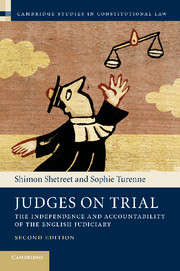Book contents
- Frontmatter
- Contents
- Foreword
- Acknowledgments
- Table of cases
- Table of legislation
- List of Abbreviations
- 1 Introduction
- 2 Constitutional steps towards judicial independence
- 3 The structure and governance of the English judiciary
- 4 Judicial appointments
- 5 Standards of conduct on the bench
- 6 Standards of conduct in extra-judicial activities
- 7 Immunity, discipline and removal of judges
- 8 Freedom of expression and public confidence in the judiciary
- 9 Conclusions
- Annex 1 Courts and tribunals structure
- Index
Foreword
Published online by Cambridge University Press: 05 June 2014
- Frontmatter
- Contents
- Foreword
- Acknowledgments
- Table of cases
- Table of legislation
- List of Abbreviations
- 1 Introduction
- 2 Constitutional steps towards judicial independence
- 3 The structure and governance of the English judiciary
- 4 Judicial appointments
- 5 Standards of conduct on the bench
- 6 Standards of conduct in extra-judicial activities
- 7 Immunity, discipline and removal of judges
- 8 Freedom of expression and public confidence in the judiciary
- 9 Conclusions
- Annex 1 Courts and tribunals structure
- Index
Summary
Foreword
Professor Shetreet's seminal work on judicial independence published in 1976 provided a systemisation of the rules and practices that safeguarded the independence of the judiciary of England and Wales at a time when the office of Lord Chancellor was of central importance. A detailed historical survey underpinned that systemisation. Lord Scarman was right to commend it in his preface to that edition. My well-thumbed copy is a measure of its use by me in the period from 2003.
That period began with the decision in June 2003 first to abolish, but then only to reform, the office of Lord Chancellor, and to create a Supreme Court and a new system for judicial appointments. The legislative changes in the Constitutional Reform Act to give effect to those decisions came into effect in 2006. Although as with many major reforms, the changes are still evolving, this is an excellent time to take stock and provide a systemisation of the new system. A second edition is not only needed, but most welcome. The stated aim is to make explicit the rules, assumptions and practices in force within our judiciary in consequence of the changes.
- Type
- Chapter
- Information
- Judges on TrialThe Independence and Accountability of the English Judiciary, pp. vi - viiPublisher: Cambridge University PressPrint publication year: 2013



